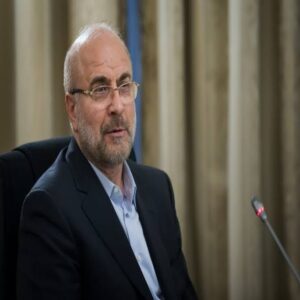Mohammad Bagher Ghalibaf Biography
Mohammad Bagher Ghalibaf Biography, Birthday & Nationality
Religion; Shia Islam
Siblings; Hassan Ghalibaf
Profession; University professor
Spouse; Zahra Moshiri (m. 1982)
Occupation Statesman Pilot
Role; Mayor of Tehran
Nationality; Iranian
Name; Mohammad Ghalibaf
Born 23 August 1961 (age 62) Torqabeh, Mashhad, Iran (1961-08-23)
Alma mater University of Tehran Tarbiat Modares University
Children; Eshaq Ghalibaf, Elias Ghalibaf, Maryam Ghalibaf
Parents; Hossein Ghalibaf, Kheirolnessa Boujmehrani
Education; Tarbiat Modares University (2001), University of Tehran
Similar People; Mohsen Rezaee, Mohammad Beheshti, Mohammad‑Ali Rajai, Mohammad‑Javad Bahonar, Haj Ali Razmara
Prior to that, he was Iran’s Chief of Police from 2000 to 2005 and the commander of the Revolutionary Guards’ Air Force from 1997 to 2000. He holds a Ph.D.
Early life
Ghalibaf was born on August 23, 1961 in the province of Razavi Khorasan. His father, Hossein Ghalibaf, was an Iranian Kurdish, and his mother, Kheirolnessa Boujmehrani, was an ethnic Persian. He was born in Torqabeh, near Mashhad, which reflects the diverse makeup of the border province.
Military career
At the age of 19, Ghalibaf served as one of the commanders of the defense forces during the Iran-Iraq War. Shortly after, he was appointed as the commander of the Rasulollah division. By the time he turned twenty-two, he had already become the commander of the Nasr Troops. Following the war, he was chosen as the Deputy Commander of the Resistance Force and Basij Troops under General Afshar. In 1996, Ghalibaf attained the rank of Major General after completing a master’s degree in Geopolitics. In 1998, he was appointed as the Commander of the Air Force of the Army of the Guardians of the Islamic Revolution when Mohsen Rezaei retired and Yahya Rahim Safavi took over as the new commander-in-chief of the IRGC.
In later years, Ghalibaf became one of the senior commanders of the Army of the Guardians of the Islamic Revolution (IRGC). In 1984, he was assigned as the head of the Khatam al-Anbia Construction Headquarters, the engineering arm of the IRGC. Under his leadership, the headquarters successfully launched a 165-kilometer railway connecting Mashhad to Sarakhs.
During the 1999 student protests, Ghalibaf served as the commander of the Revolutionary Guards Air Force. Along with 23 other IRGC commanders, he sent a threatening letter to the reformist president Mohammad Khatami, warning that they would take matters into their own hands if the protests were allowed to continue.
Police career
After the 1999 protests, he was appointed as the head of the Iranian Police Forces by Ali Khamenei, the Supreme Leader of Iran, replacing General Hedayat Lotfian who was removed from his position during the unrest. As the chief of police, Ghalibaf implemented several reforms, such as dropping all lawsuits against newspapers, modernizing police equipment, and launching the Police 110 project, which aimed to enhance public accessibility to the police.
On April 5, 2005, Ghalibaf resigned from his military positions, including the police forces, in order to run for the presidency of Iran.
Following his loss in the 2005 election, Ghalibaf was proposed as the Mayor of Tehran alongside Mohammad Aliabadi and Mohammad-Ali Najafi. On September 4, 2005, he was elected as the new Mayor by the City Council of Tehran, succeeding Mahmoud Ahmadinejad who vacated the office after becoming president. He secured 8 out of 15 votes from the council. Ghalibaf was reelected for a second term in 2007, receiving 12 votes without any opposition.
According to Bloomberg, he has utilized his position as mayor to establish a reputation as an effective politician. Ghalibaf sought reelection as the Conservative candidate in the 2013 local elections. His opponents included Mohsen Hashemi, Masoumeh Ebtekar, Ali Nikzad, and Mohsen Mehralizadeh. He won another term as Mayor on September 8, 2013, defeating Hashemi in a runoff with 51.6% of the votes.
In the 2005 presidential election, Ghalibaf ran as a candidate and was initially considered to receive support from certain factions of the conservative alliance due to his popularity among both wings. However, in the final days leading up to the election, the majority of support shifted towards Mahmoud Ahmadinejad. Ghalibaf finished fourth in the election. He adopted a populist approach during his campaign.
On October 13, 2008, he announced his endorsement for dialogue with the United States, as proposed by P.
The 2013 presidential election saw Ghalibaf’s entry into the race after not running in the 2009 elections. His adviser made the announcement in June 2013, and Ghalibaf officially declared his candidacy on July 16, 2012. During his announcement speech, he emphasized his commitment to the Constitution and the rights of prisoners and detainees.
Ghalibaf’s campaign adopted the official slogans of Love and Sacrifice and Jihadi Change. His candidacy was approved by the Guardian Council on May 21, 2013, along with seven other candidates. He opposed Ali Akbar Hashemi Rafsanjani’s candidacy, arguing that Rafsanjani had already served two terms. Ghalibaf, along with Ali Akbar Velayati and Gholam-Ali Haddad-Adel, formed a coalition called “2+1”. He received endorsements from former candidates Alireza Ali Ahmadi and Sadeq Vaeez Zadeh, as well as support from Ali Larijani, the current chairman of parliament.
Ghalibaf’s tenure as Tehran’s mayor showcased his moderate approach, as noted by the Guardian. In the election, he secured 6,077,292 votes (16.55%), placing him in second position behind the winner, Hassan Rouhani. Shortly after the results were announced, Ghalibaf congratulated Rouhani on his victory and conceded defeat.
In terms of party affiliation, Ghalibaf is considered the spiritual leader of the Progress and Justice Population of Islamic Iran and the Iranian Islamic Freedom Party. He is also a member of the political alliance Popular Front of Islamic Revolution Forces.
On a personal note, Ghalibaf married Zahra Sadat Moshir in 1982 when he was twenty-two years old. Moshir joined him as an adviser and head of Women’s affairs in the Municipality of Tehran.
Ghalibaf has received recognition for his achievements, including being ranked 8th in the World Mayor competition in 2008 and securing 2nd place in the Sustainable Transport Award in 2011.




